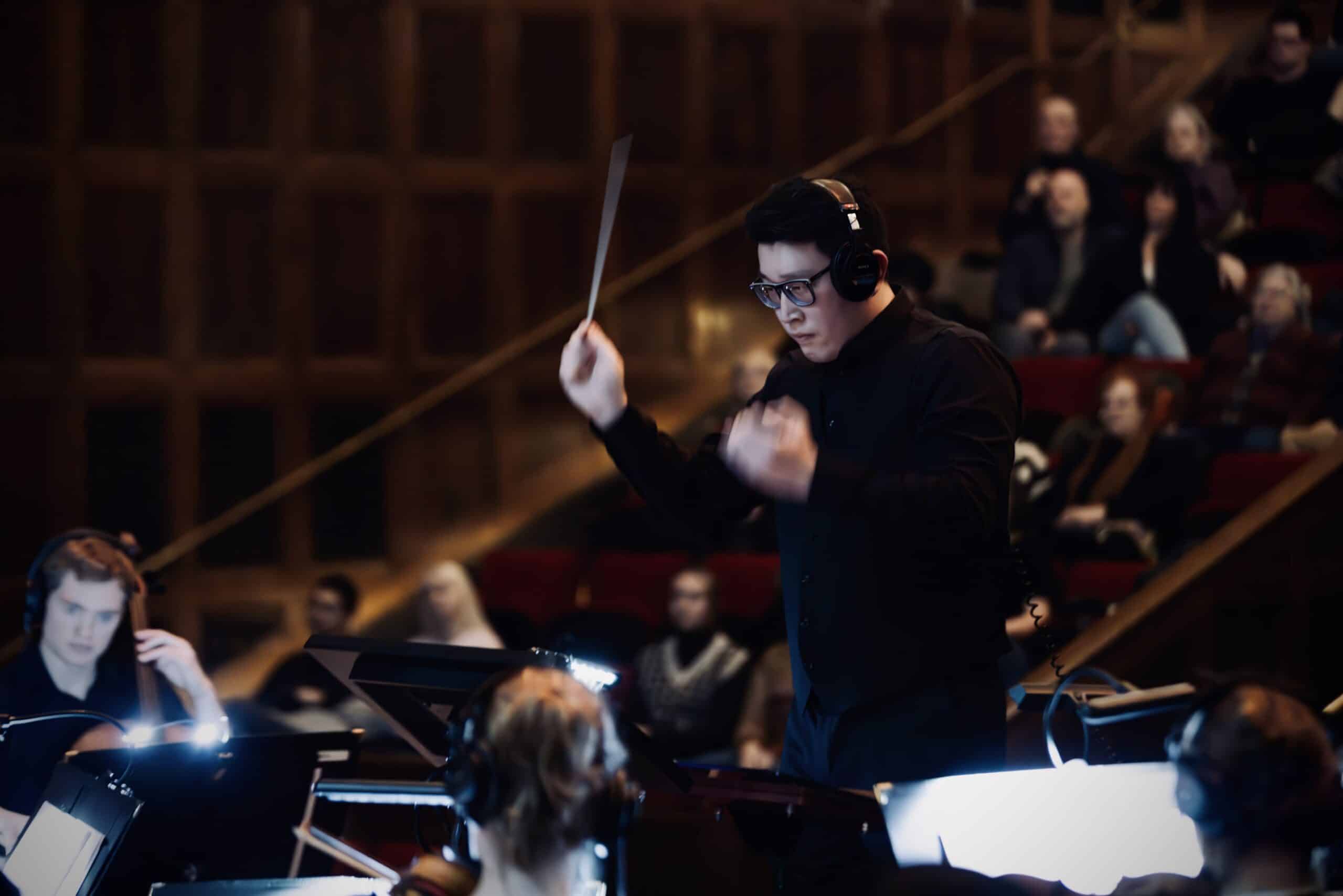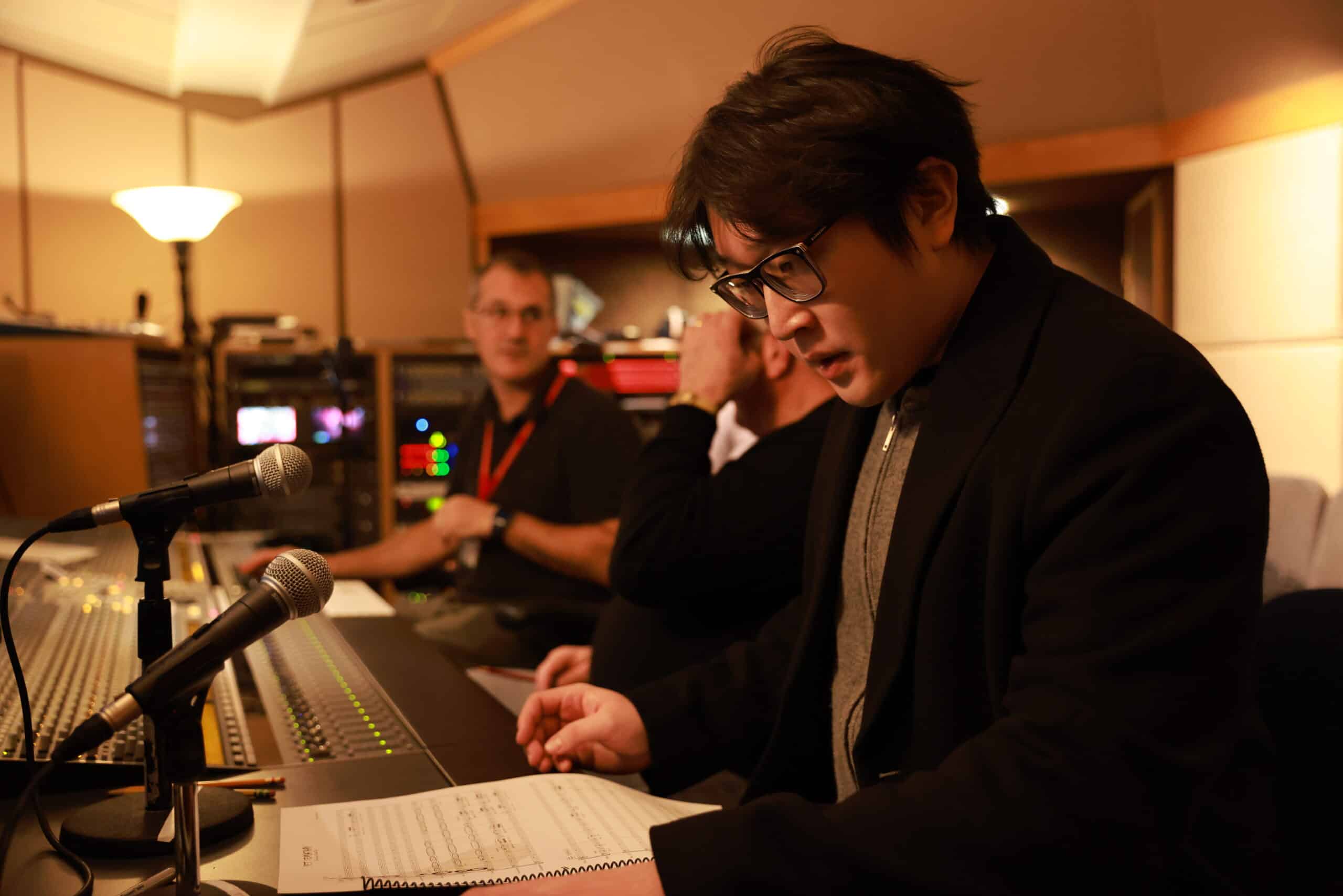Dian Shuai, a music and film composer from Beijing, China, has been immersed in music since the age of three. A skilled pianist and baroque keyboardist, he earned his Bachelor of Arts in Music from UC Berkeley and a Master of Music in Film Composition from the Eastman School of Music.
His accomplishments include orchestrating the documentary Eastman at 100, composing for the Off-Broadway musical Dreams of Dracula, and winning the 2023 Global International Music Competition. Known for blending classical traditions with modern storytelling, Dian’s emotionally rich compositions continue to captivate audiences worldwide.
We extend our heartfelt thanks to Dian for sharing his experiences and insights with our readers.
DIAN SHUAI CONDUCTING A LIVE-TO-PICTURE FILM CONCERT. IMAGE: WENXIN LUO
1. Congratulations on winning the Best Original Score, Gold Award at the Independent Shorts Awards! Can you tell us about the project and what this recognition means for your career as a composer?
Thank you so much! The project, titled Secret Garden, tells a heartfelt story about a young girl, Anna, who discovers a boy named Ryan locked in a room at the end of a garden. The two form a deep friendship, sharing their stories and secrets through a string phone. Through their conversations, Ryan helps Anna uncover hidden memories from her past.
This award marks my first recognition for Best Original Score, and it feels incredibly meaningful to me. It’s an affirmation of my work as a composer and a tremendous encouragement to continue refining my musical voice. It has strengthened my confidence in telling stories through my music and staying true to my artistic style.
2. Your musical journey started at a young age, with achievements like recording a piano album and performing at the Wiener Musikverein by 11. How did these early experiences shape your approach to composition and storytelling through music?
Those early experiences were formative in shaping my approach to music. They taught me discipline and the profound connection between music and audience. Performing at prestigious venues like the Wiener Musikverein at such a young age instilled in me the importance of that connection. It also taught me how to tell stories through music, whether through a single piano note or a full orchestral arrangement.
Additionally, my classical music training has given me a deep understanding of both emotional depth and technical precision in composition. Over time, I’ve learned how to blend these elements seamlessly, finding a balance between classical influences and modern styles. This classical foundation enables me to express emotions more intuitively, making the process of storytelling through music feel both natural and organic.
3. You’ve worked across diverse mediums, including an immersive Off-Broadway musical, a documentary, and film scores. How do you adapt your creative process to suit such varied projects?
Each project feels like entering a brand new world. I begin by immersing myself in the narrative and understanding its essence—whether it’s the intimate emotions of a character or the grand arc of a story. I focus on capturing the heart of the story and tailoring my musical approach to amplify those themes.
For me, it’s about being versatile while staying authentic to the essence of each project. The key is listening—listening to the director, to the story itself, and to what the music wants to say. I always believe that when you’re fully true to yourself, you naturally bring something unique and irreplaceable to the world. Each project offers an opportunity to explore and bring my own voice to something that feels deeply personal and meaningful.
4. Baroque music is a clear passion of yours. How does your extensive study of classical music influence your contemporary compositions for film and television?
Baroque music has taught me the art of structure and counterpoint, which naturally influences my compositions. Its clarity and balance are qualities I strive to emulate, even in contemporary contexts. Classical music reminds me that beauty often lies in the details—whether I’m scoring an epic scene or a quiet moment, I aim to infuse that timeless elegance into my work.
In my musical language, counterpoint and modulation are central to my compositions. I love writing polyphonic music, where multiple voices intertwine and evolve together. It’s a technique that not only adds depth to the music but also enhances the emotional resonance of the visuals. The influence of Baroque music allows me to create complex, yet accessible scores that feel both grounded and dynamic.
5. Your compositions are celebrated for their emotional depth and technical precision. How do you approach the challenge of blending these elements when creating music for visual storytelling?
It starts with empathy—truly feeling the story and connecting with the characters. The emotional core always comes first. From there, I use my technical knowledge to shape that raw emotion into something cohesive and impactful. In other words, I see myself as a translator, converting all these emotions and feelings into the language of music.
As Kandinsky said, “Art is to express emotions like music,” and I deeply agree. It’s a delicate balance, much like painting: the heart is the inspiration, and the technique is the brush that brings it to life. When both elements come together, they create something that resonates and leaves a lasting impression.
6. With formal training from UC Berkeley and Eastman School of Music, what are some key lessons or techniques from your studies that have become cornerstones of your work as a composer?
One of the most important lessons I learned throughout my studies is the power of storytelling. At Eastman, I had the privilege of studying with renowned composers like Mark Watters and Jeff Beal, who helped me understand how music can enhance and support the narrative.
Another core concept I took away is the balance of tension and release. This dynamic is essential in creating a compelling film score, where building tension and then releasing it has such a dramatic impact.
As someone who’s deeply passionate about counterpoint, I made sure to take every counterpoint course available at both UC Berkeley and Eastman. These courses were incredibly valuable, providing me with the tools to weave complexity and clarity into my compositions.
At Berkeley, I also gained a strong foundation in music theory and developed a curiosity for blending traditional techniques with innovative approaches. My involvement with the UC Berkeley Baroque Ensemble, where I played harpsichord and organ, was particularly influential, allowing me to immerse myself in the beauty and depth of Baroque music.
These experiences have been fundamental in shaping my approach to composition. While technical knowledge and techniques are crucial, I believe they truly shine when they serve a deeper, more authentic expression.
7. What’s next for you after this award? Are there any upcoming projects or collaborations that you’re excited to share with us?
I’m currently working on several new projects, including a cinematic album that blends classical and contemporary elements, as well as composing scores for films across different genres.
These projects offer exciting opportunities to explore new styles and push the boundaries of my musical language. I’m also creating more music outside of film, which has been a rewarding experience. Each new collaboration is a chance to further define my voice as a composer and musician, and I’m eager to share more soon.


COMMENTS